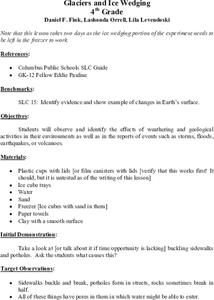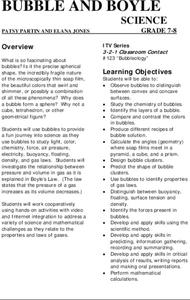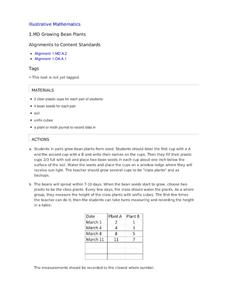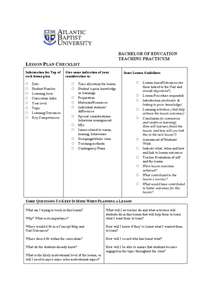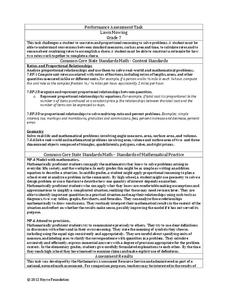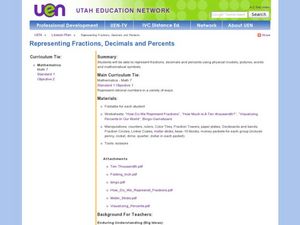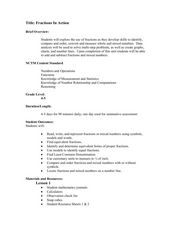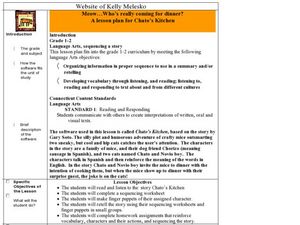Calvin Crest Outdoor School
Survival
Equip young campers with important survival knowledge with a set of engaging lessons. Teammates work together to complete three outdoor activities, which include building a shelter, starting a campfire, and finding directions in the...
EngageNY
Translating Graphs of Functions
If you know one, you know them all! Parent functions all handle translations the same. This lesson plan examines the quadratic, absolute value, and square root functions. Pupils discover the similarities in the behavior of the graphs...
Curated OER
Glaciers and Ice Wedging
Fourth graders observe and identify a variety of weathering and geological activities in the area in which they live. This focuses primarily on what happened during the Ice Age, and how, even today, glaciers are shaping and re-shaping...
Curated OER
Physical Changes and States of Matter - One
Third graders study the three states of matter and identify the physical changes that take place between them. There is an initial teacher-led demonstration followed by a meaningful whole-class inquiry. These two activities should lead...
Curated OER
Bubble and Boyle
Middle-schoolers still enjoy playing with bubbles! In this series of eight laboratory activities, science learners explore convex and concave surfaces, angles, gas laws, buoyancy, density and more!
Illustrative Mathematics
Growing Bean Plants
Plant growth experiments offer rich, cross-curricular learning opportunities that can really excite and engage young learners. In this series, children work in pairs planting, measuring, and comparing the height of bean plants in order...
Curated OER
Rounding Decimals
Fourth graders engage in a lesson that is about the concept of rounding decimals. They review place value and focus it upon the practice of rounding. Students use 10 base decimal grids or models to help make connections with the skill.
Curated OER
Ice Cream: a Taste of Science!!
Students define the term solution. They explain conservation of energy and energy transfer as it relate to how the milk solution became ice cream. Students are able to explain freezing point depression.
Curated OER
Multiplication Sequences
In this math learning exercise, learners learn that a sequence is a set of numbers which follows a mathematical rule. Students look at math sequences and fill in the missing numbers and also explain in words what the pattern is. Some of...
Curated OER
Living in a Geometrical World
Learners participate in a series of hand-on, online, and multimedia activities to examine 2 dimensional and 3 dimensional shapes. They describe common geometric solids. They construct rectangular prisms using straws and ribbon.
Curated OER
States of Matter Lesson
Second graders identify the three phases of matter and demonstrate how a property can change states of matter. In this states of matter lesson, 2nd graders make an Ooze to discover how a solid changes into a liquid. Students...
Curated OER
Multiplication: Bugs Can Multiply, So Can I!
Develop multiplication skills with your class. Youngsters will visualize multiplication as repeated addition. Then they will create a multiplication bug book and discover arrays as a strategy for multiplication problem solving....
American Farm Bureau Foundation for Agriculture
Shapes in Agriculture
It's time to get crafty with shapes! Your future farmers demonstrate their geometric ability by building a farm using triangles, circles, rectangles, and squares. But first, scholars take part in a brainstorm session inspired by their...
Super Teacher Worksheets
Solid Figures
In the hustle and bustle of everyday life it's easy to forget that geometric shapes are everywhere in the world around us. As they complete this shape identification worksheet, young mathematicians realize that many common real-life...
Math in English
3-D Shapes
Young mathematicians look at five 3-D shapes and name them based on the accompanying image. For each shape, learners state the number of faces, vertices, and edges.
Noyce Foundation
Lawn Mowing
This is how long we mow the lawn together. The assessment requires the class to work with combining ratios and proportional reasoning. Pupils determine the unit rate of mowers and calculate the time required to mow a lawn if they work...
Curriculum Corner
Splashes of Spring Math Centers
Spring into math practice with a set of resources that taps into a variety of math practice. Skills include matching expressions to their definitions, a place value sorting activity, three multiplication and division games,...
Curated OER
Nonstandard Units
Here is a very good measurement worksheet. Four problems are solved in which objects at home are measured using the specified nonstandard measurement units such as toothpicks, footsteps and teaspoons.
Curated OER
Representing Fractions, Decimals, and Percents
In this fractions, decimals, and percents lessons, students explore various methods of representing fractions. They demonstrate situations that represent rational numbers. Students create a foldable exploring fractions, decimals and...
Curated OER
Picasso Portraits
Explore Pablo Picasso. For this art history and face drawing lesson plan, read a brief biography of Pablo Picasso. Draw a self portrait following guided instruction by the teacher. Paint a self-portrait and practice adding white...
Curated OER
Sizing Cells
Students examine how living cells reproduce to make new cells. For this cell reproduction lesson students complete a lab activity and answer questions.
Curated OER
Fractions in Action
Investigate equivalent fractions with your class. They compare and order fractions. Then they work cooperatively in groups to experiment and problem solve with fractions using a game format. Multiple resources are provided.
Curated OER
Lesson Plan for Chato's Kitchen
Through an exploration of Chato's Kitchen by Gary Soto, learners practice sequencing skills, retelling a story, and Spanish vocabulary words. All of the necessary resources, worksheets, and other materials are provided in order to give...
Curated OER
Cool Stuff
Young scientists must place a check mark next to the answer they think is correct regarding things that are warm, cool, hard, and soft. This would be a good way to begin discussing how some things actually change states of matter...




